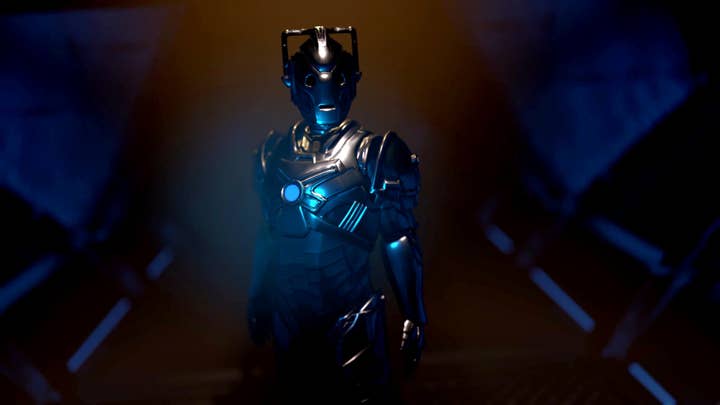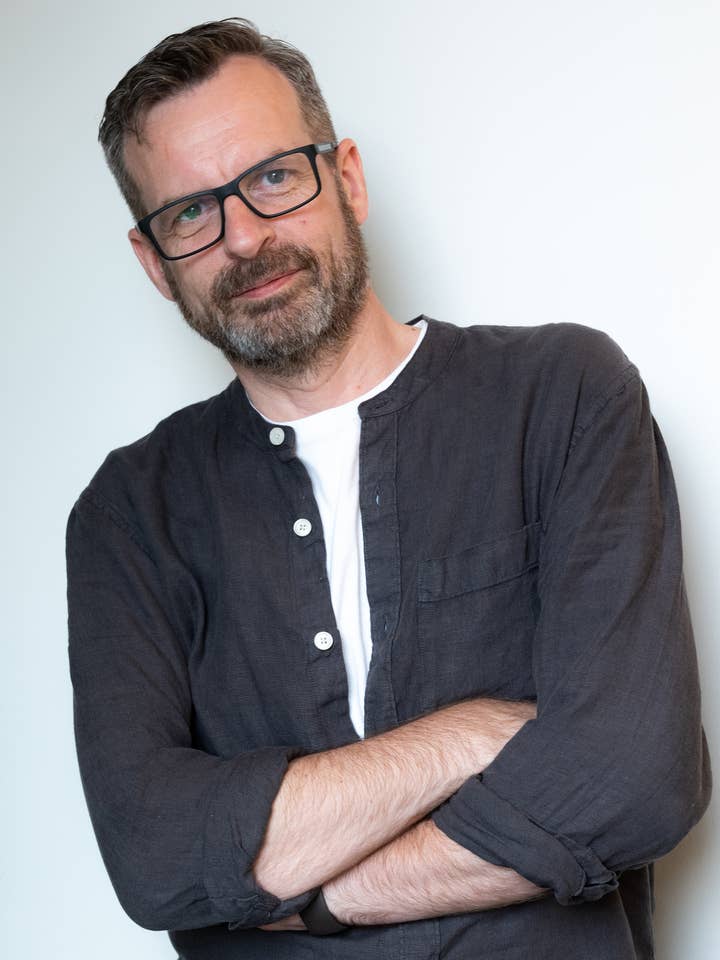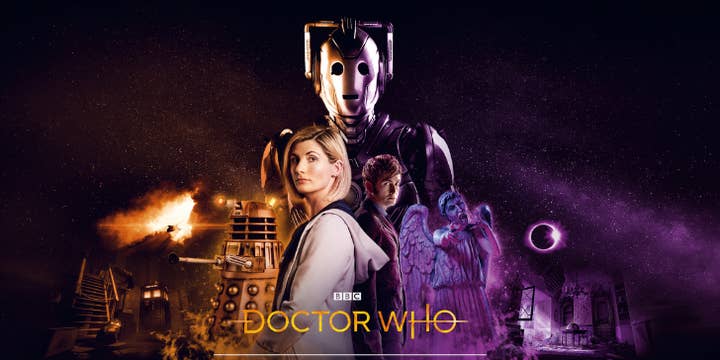Maze Theory: “Doctor Who is a proof point for our approach to telling stories”
The developer discusses its plans to release four games in one year
It's quite difficult to imagine any studio, no matter its size, releasing four games in 12 months. Let alone an indie team in London with barely 30 employees.
But that's exactly what Maze Theory is planning to do in 2021. And they aren't any old games, either. Two are based around the BBC's Doctor Who IP, including a full console game (Edge of Reality) and a found phone mobile adventure (The Lonely Assassins). Another is a VR game set in the world of Peaky Blinders.
Of course, it isn't doing all of this alone. It's rapidly expanding following a £1.4 million investment earlier this year, it has expanded its team to the US, and has also partnered with developers Kaigan Games (Sara is Missing) and Just Add Water (Oddworld) for help.
"The nature of who we are is that we want to collaborate with the best people"
Ian Hambleton, Maze Theory
"We have about 28 people in our company, which is obviously not a very big studio to be launching four games next year," admits CEO Ian Hambleton. "And we know that we are on a pretty ambitious strategy. The nature of who we are is that we want to collaborate with the best people. So we said to ourselves that we will be all over the story and the action and the content [of the mobile Doctor Who game], but why shouldn't we work with the best people who make found phone games, and who basically created the genre?
"So we reached out to Kaigan. That is how that started. But there is a team here that is always on that project, and similarly with Just Add Water, they have a really good reputation in the industry for creating fantastic games."
Studio director Russ Harding adds: "There are some Whovians there, too, so there is an absolute passion for this. Although I suppose you'll find that 50% of developers have a Whovian amongst them."

Hambleton again: "What's really exciting with working with other people is seeing their approach to things. The collaboration with Just Add Water has added huge amounts to Doctor Who: Edge of Reality, and there's a whole second part of that game, featuring Cybermen, and a lot of that has come from them."
Back to Harding: "The shift we've had to make because of COVID has helped with the collaboration in a weird way. Everyone is extended now. From a communication perspective, and working together in a collaborative way, it feels very much like this is just the team."
It didn't take long for COVID-19 to enter the discussion, but it was inevitable. Since the pandemic hit the UK, Maze Theory secured its investment, doubled the size of the team, and even opened a US operation.
"It has been a strange old time going into lockdown," Hambleton says. "We were something like 13 or 14 people at the time, and now we're almost 30. The irony is that if we all came back into the office, we wouldn't fit. So we are adapting to that new world"
Harding adds: "Yeah, it has opened up the doorway a bit, hasn't it? It's allowed us to reach out to talent wherever they are. Mostly still UK-based, but it's taken away that London barrier and allowed us to be a bit more open."
"Now we're almost 30 staff... If we all came back into the office now, we wouldn't fit"
Ian Hambleton, Maze Theory
Maze Theory has just broken cover on its next two Doctor Who games -- the aforementioned Edge of Reality and Lonely Assassins. Both are part of a trilogy of Doctor Who titles, which began last year with the VR adventure Doctor Who: The Edge of Time. The Lonely Assassins is the mobile game featuring the iconic Doctor Who villains The Weeping Angels, and The Edge of Reality is a console title built on the framework of last year's VR game, with some of the same elements and story, but with additional levels, extended areas and a few surprise twists.
"When we worked on [VR game] Edge of Time... as you know when you start to delve into the Whoniverse and start to live and breathe it, there's a lot there," Harding says. "We created such a big scale story that we really wanted to deliver."
Hambleton continues: "The stuff we're really interested in are these big universes and these sub-stories. It harks back to our philosophy around the evolution of storytelling, and telling stuff in bold new ways on new technologies. We started that in VR, but rapidly we realised with Doctor Who that there are opportunities to explore those in mobile, and in a console game because it can be more expansive. What Who has become is a bit of a proof point for our approach of using different technologies to tell different parts of the story in different ways."

It's not quite a traditional trilogy. All three will offer different experiences and stories, just set within the same timeline. And although the focus is on the new console and mobile games, there is a further expansion planned for the VR title, which will be arriving imminently.
"[Edge of Time] probably hit VR at a very good moment in time, with things like Oculus Quest launching and PSVR still doing so well," Hambleton says. "It was a great statement piece to launch. We've been reasonably excited by how it has done. And it allows us to explore the universe of Doctor Who in a really immersive and creative way. If you want to live in the world of Doctor Who, Edge of Time is the best way to just exist in that universe and stand in it."
Edge of Time was a unique Doctor Who experience, with elements that worked particularly well with a VR headset. The Weeping Angels -- stone monsters that only move when you're not looking at them -- were a particularly scary proposition in VR, and there are several other moments like this throughout the game. The upcoming console game is using Edge of Time as its foundation, so was it hard to translate those VR moments to a more traditional controller and TV set-up?

"We've looked at trying to adapt some of those immersive mechanics that you get in VR -- things like opening drawers and cupboards -- and explore the world in a similar way," Harding says. "We spent a lot of time in trying to still keep that essence of immersion. It still has a lot of that Whovian spirit of discovery and adventure and figuring things out. The console game has allowed us to get a little bit deeper into the story than we could do... It's about story at the forefront.
"It's the same with the mobile game. It's about immersion. It's modern day. It feels like you're receiving texts from these characters. This is what drove us to Kaigan Games. Because we were asking ourselves that if we do something in mobile, how do we keep it immersive? And it's definitely our approach on console as well."
Hambleton adds: "We don't want to just make games across lots of platforms that are all the same. Your FIFA game is something you play on the console in a certain way, and then you have a port to mobile... but essentially you're playing the same game. What we are interested in is creating a whole new story for that platform that really fits that device."
Alongside the Doctor Who console and mobile games, the firm is also actively working on a Peaky Blinders VR title (The King's Ransom), which is due late next year. But Maze Theory isn't entirely about making licensed products.
"We are working on Project Engram, which we haven't fully announced yet," Hambleton explains. "That's our own IP project... It's going to have its own universe that we're going to build. We see it as a first in a trilogy. It has a lot of similarities and it still has lots of entertainment, immersive theatre threads that we have on Doctor Who and Peaky Blinders.
"Doctor Who and Peaky Blinders have allowed us to create our own stories. It really helps if you make something partially your own, rather than copying a show"
Russ Harding, Maze Theory
"But the licensed games are really important. Our next big project is probably going to be another big IP. We are always going to be a studio that gets excited by both."
Harding continues: "What's excited us about the Doctor Who IP and the Peaky IP is that obviously we have a passion for them, and we love the worlds that they're in. But they also allowed us to create our own stories within them, and that allowed us to really, really focus in on delivering it to that medium, and be part of that and add to the canon as well. I think it really helps if you make something partially your own, rather than copying a movie or the show.
"We have been really fortunate with both teams being able to work with the show runners, and getting Steven Knight (Peaky Blinders) involved. Both IPs have allowed us to have access to everything. They treat us as part of the team, they review our content, they collaborate... that's really important to us. Because it means we're authentic and really represent that IP, rather than buying an IP off a shelf and wrapping a gameplay mechanic around it."
Doctor Who and Peaky Blinders are brands that suit what Maze Theory is hoping to achieve. Both are narrative-driven, with expansive universes to explore, which enable the studio to experiment with different technologies in its mission to find a 'new form of entertainment'.
"We have a really bold vision," Hambleton concludes. "We want to create a new entertainment genre between film, TV and gaming that didn't previously exist. We want to have games and experiences that exist between the big films and TV shows that are happening... It's about taking the drama and the narrative that you get in TV, but experiencing it in a much more immersive way. It sounds way too epic to say 'we want to create a whole new genre of entertainment'. But that is the vision.
"And then there's the other, more immediate vision. Which is to create four great games over the next year that do well and fans love."

